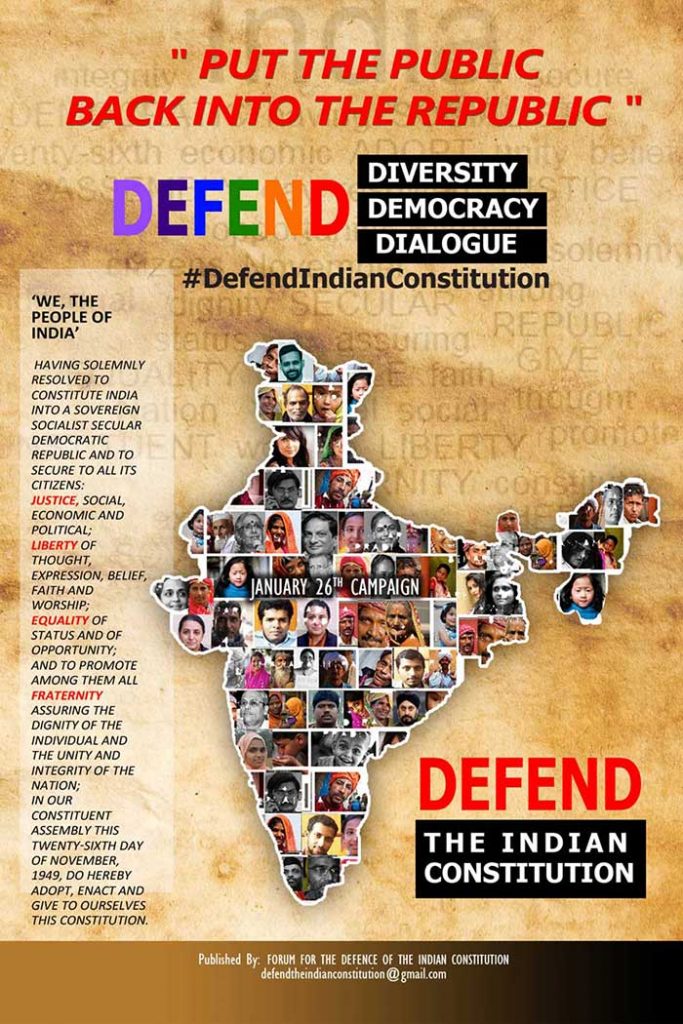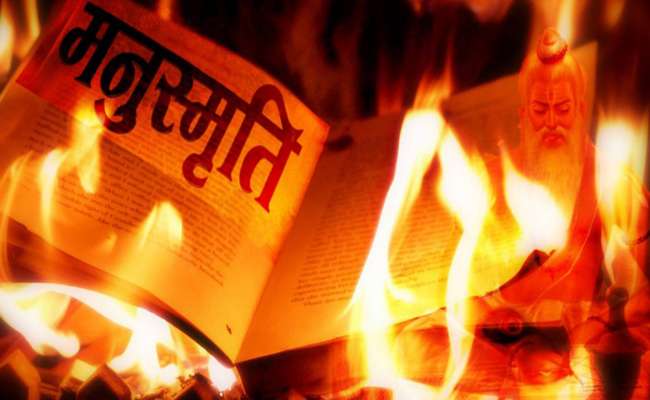by Sandeep Pandey and Vishwas Bhamburkar

The preamble to the Constitution begins with “We, the People”. Thus, the idea that the citizens are the sovereigns, should have been the pervasive thought flowing from the Constitution as viewed by all the powers that be.
Is the citizen the sovereign? If she is not, isn’t the whole constitution a farce? And if you believe she is, what are the answers to the following questions?
How many “people’s representatives” actually act on any representation that they get from the citizen? Some may send a routine acknowledgment and forget about it. Is any action being taken upon a representation by a citizen?
How many political parties will act on anything because I, the citizen, want it and it is as per the law?
How many public servants, be they high and mighty bureaucrats, or the judges of constitutional courts, will do anything because I, the citizen, the sovereign want it and it is in concordance with the law?
A realistic guess is: none. That is where the soul of democracy has been sucked out a long time ago. What is left is drama, theatrics and posturing, something which gives the appearance of a democracy but in reality is not.
The people’s representatives, bureaucrats, and public servants of all hues, get their authority from the power to say no. They have the power to disempower the citizen, which is sometimes done politely and at most times in a crude manner. Go to either the High Courts or the Supreme Court and ask for as simple a thing as registration of an First Information Report because the police are not doing their duty, even a Bench led by the Chief Justice may tell you that your petition is not maintainable because there are alternate remedies available. Another way to say no. Never mind the fact that the alternate remedies are dysfunctional too. He will say the Lalita Kumari judgment has been passed but he will not remedy or address the fact that it is not implemented. Look at the effort medal winning female wrestlers had to put in, even with some media support and public attention, to get their FIR registered.
Even in this case, the Supreme Court will only look at registration of the FIR, but will not address why the police did not lodge it in the first place. Treating the disease takes time and effort and acknowledgment. An acknowledgement that something is wrong. An acknowledgment that what was thought to be a remedy has not really worked. More importantly, an acknowledgment that the citizen is the sovereign and if a citizen says something, it must not only be taken at face value, but must be acted upon. In today’s times, even treating the symptoms has come to be seen as a largess, a magnanimity, a benevolence shown by today’s aristocrats who have usurped the “rule of the people” unto themselves. And so, we have the Supreme Court very arrogantly patting itself on the back for having ordered registration of FIR on the female wrestlers’ complaints.
Also, alternate remedies are for the convenience of I, the citizen, the sovereign, and not for public servants to shirk their responsibility by passing the buck.
How many times have you been told not to argue with a bureaucrat because he can spoil your case if you argue? Who gave those public servants that right? They usurped it from I, the citizen, the sovereign because I the citizen, the sovereign chose to be servile to those who are there to serve us.
The above, of course, is based on the assumption that you manage to reach the bureaucrat in the first place. Any bureaucrat of importance would be sitting in the Secretariat. And the struggle of the citizen would begin from gaining entry into the Secretariat to meet the bureaucrat. Often you’ve to get a pass made at the security gate to enter the premises where the bureaucrat’s office is located and a pass can be made only if his/her office instructs the security at the gate. This implies that one should have some prior acquaintance with the bureaucrat one is wanting to meet. So, what will happen to I, the citizen, the sovereign who doesn’t have any ‘connections’?
Try an experiment, fill up any usual form in a government office in red ink and see the reaction – there is no rule that prohibits citizens from using any ink colour, but even the public servant at the lowest rung, sitting at the counter can refuse the form because he thinks this ink colour is reserved for his high officials to use, not lowly citizens, who are in fact the sovereigns.
I, the citizen, collectively, We the People, will mollycoddle the government servant and comply with his whims. And should a citizen, who is supposed to be the sovereign, dare protest, he can be physically removed from the office as has happened with some information seekers in hearings before Information Commissioners in Lucknow. Right to Information Act is the first law which allows individual intervention by a citizen, holding executive and people’s representatives accountable, but the bureaucracy has discovered ways to blunt the power of this Act.
In our democracy, We, the People were envisaged to be supreme. We had people’s representatives to put forth our ideas. The public servants to serve us; cater to our every demand so long as it was according to the law. Not once have we seen anyone asking a public servant whether what he is asking is as per the law and if yes, his reason(s) for refusing to do our work. And the people’s representatives, who are supposed to keep a check on the public servants, will usually lie prostrate before them because their pretty perches shouldn’t be disturbed.
At the stroke of the midnight hour on 15th August, 1947, India had had its tryst with destiny. On 26th November, 1949, the Constitution of India came into force. On 17th April, 1952, we had the First Lok Sabha constituted. And that completed the grand illusion that power had been transferred to the people at large. As the anecdote goes, once in the Parliament complex, a woman caught hold of Nehru’s collar and asked, “The country got freedom, what did I get?” Nehru replied with a smile, “ Freedom to grab the PM’s collar.”
Today, that freedom is sadly lost too. Try grabbing, not the PM’s collar, but even the collar of any person who is defined as a public servant and see the results. The people’s representatives, the bureaucracy, the judiciary, have arrogated power to themselves, because I, the citizen, the sovereign gave them the power to get away with it.
We today are faced with an illusion of democracy and a pretension of “power to the people” and a misconception that we have “rule by the will of the people”. We delude ourselves that public servants are there to serve us.
Transfer of power has indeed taken place. It has flowed from rule by divine right that kings, emperors and their henchmen had, to rule by a few — elected representatives and their henchmen, public servants.
Every five years (sometimes even less) we cast our vote and participate in the “motion of democracy” that gives us three tiers of people’s representatives. The ones to local bodies — Members to Gram Panchayats, Councillors to Municipalities or Corporators to Municipal Corporations, then the Members to the Legislative Assemblies of the States and the Members of Parliament, specifically, Lok Sabha. And we believe we have got the power to rule. But these elected representatives only frame the laws. The implementation is by the Executive — the bureaucrats, appointed after selection through a process, do not get changed, only transferred or reshuffled. They remain the proverbial leopards who never change their spots. They are assisted by their minions who too, once selected, do not get either reassessed or renewed. The third category of public servants fill the ranks of the judiciary, who, once selected, will continue to rule in the name of serving not just till their superannuation, but maybe for years later too.
There is no way for the citizen, the sovereign, to ensure these two long-term public servant categories out of the three pillars of democracy, act on her will and do things that results in the rule by her.
Further compounding this is that for over 76 years, we have not developed a system where the will of the people reaches anyone at all. There is no way for I, the citizen, the sovereign to put forth what I want, explain how it is as per the law of the land and to get it done. The only way left is to form a group. A group large enough to put pressure or foment trouble will ensure that one’s voice will get heard; and what has to be done will get done. A group’s wish, not an individual’s.
We have not created a system to ensure that the incumbents of the other two pillars of democracy are kept in check by the elected representatives to ensure that they function according to the will of the citizens, the sovereigns.
While the citizen gets a chance every 5 years to change the elected representative, unfortunately, she has no such opportunity to change either a bureaucrat or a judge. This gains more importance in view of the fact that while a citizen has to face the repercussions of violating the law, the country and the people pay for the law being violated by bureaucrats and judges.
Also, there is no system in place for a citizen’s will to reach the people’s representative and to ensure that that is considered. Political parties, which could have been a bridge between the citizens and the elected representatives, have till now reduced themselves to being only power-brokers or election machines.
It is sad that when asked who the custodian of the Constitution of India is, the answer is Supreme Court of India and not We, the People. That explains things for what they are.
We today stand at the edge of a precipice. If I, the citizen, the sovereign, do not stand up for what I want, what the Constitution of India guarantees to us, we will just flow. Flow with the gushing reasoning of ‘larger public good, where democracy is flung down the precipice into the dreary desert sands of a mobocracy, only because a mob, meaning “a large crowd of people, especially one that is disorderly and intent on causing trouble or violence” can effect might is right and rights of an individual have no meaning.
Vishwas Bhamburkar is a Ahmedabad based social activist and Sandeep Pandey is General Secretary of Socialist Party (India). E-mail ids: [email protected], [email protected]
















































